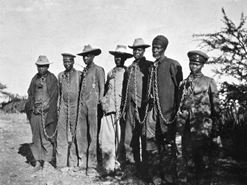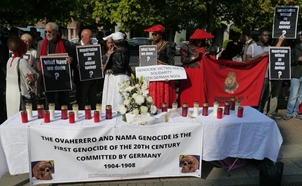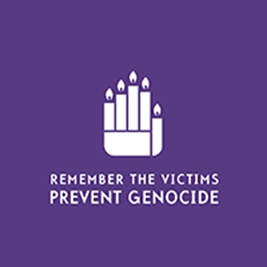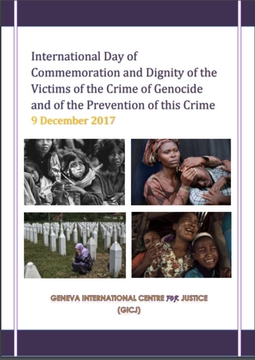09.12.2018
By: Leureta Lumi
Seventy years ago, the United Nations convention on genocide was adopted, declaring that all countries have an obligation to prevent and punish genocide. World Genocide Commemoration Day on December 9 is a global event instituted by the United Nations (UN) to commemorate victims of genocide and highlighting humanity’s responsibility to prevent future genocides. According to the Genocide Convention (article 2) genocide is defined as "any of the following acts committed with intent to destroy, in whole or in part, a national, ethnical, racial or religious group … ", including:
• Killing members of the group;
• Causing serious bodily or mental harm to members of the group;
• Deliberately inflicting on the group conditions of life calculated to bring about its physical destruction in whole or in part;
• Imposing measures intended to prevent births within the group;
• Forcibly transferring children of the group to another group.
The Convention confirms that genocide, whether committed in time of peace or war, is a crime under international law which parties to the Convention undertake “to prevent and to punish” (article 1). The primary responsibility to prevent and stop genocide lies with the State.
According to the UN resolution defining the event’s scope, it is also designed to stress “the responsibility of each individual State to protect its populations from genocide, which entails the prevention of such a crime, including incitement to it, through appropriate and necessary means, and that fighting impunity for the crime of genocide is an important factor in its prevention.”
The day is also intended to recall the significance of the United Nations Genocide Convention. The UN General Assembly signed the agreement on December 9, 1948-precisely 67 years before World Genocide Commemoration Day was first observed in 2015.
 |
 |
Right : Herero prisoners stand in chains during the Namibian genocide (1904) [Photo: namibiansun.com]. The concentration camp imprisonment and mass murder of the Herero and Nama people marked the first genocide of the 20th century. Left : Demonstrators in Berlin demand justice for Namibian victims of German genocide. [Photo: Joachim Zeller.]
Prevention of Genocide:
The event is an opportunity to memorialize and honor victims of past genocides. While conflict has many causes, genocidal conflict is identity-based. Genocide and related atrocities tend to occur in societies with diverse national, racial, ethnic or religious groups that are locked in identity-related conflicts. It is not simply differences in identity, whether real or perceived, that generate conflict, but the implication of those differences in terms of access to power and wealth, services and resources, employment, development opportunities, citizenship and the enjoyment of fundamental rights and freedoms. These conflicts are fomented by discrimination, hate speech inciting violence and other violations of human rights.
In terms of prevention, the critical step is to identify the factors (discriminatory practices) in a given situation that lead to or account for acute disparities in the treatment of a diverse population, and to seek ways to diminish and eventually eradicate these possible causes of genocidal violence. Given that no country is perfectly homogeneous, genocide is a truly global challenge.

Responsibility to Protect:
At the 2005 World Summit, Member States committed to protect their populations from genocide, war crimes, ethnic cleansing and crimes against humanity, as well as their incitement. They agreed that when States require assistance to fulfil that responsibility, the international community must be ready to assist them and, when States manifestly fail to protect their populations from those crimes, the international community must be ready to take action, collectively, in accordance with the United Nations Charter. Intervention only happens when prevention fails. Therefore, prevention is the basis of the principle of the responsibility to protect.
These three pillars of the responsibility to protect are articulated in the Outcome Document of the World Summit (A/RES/60/1, para. 138-140) and formulated in the Secretary-General's 2009 Report (A/63/677) on Implementing the Responsibility to Protect. The political commitment made by Member States in 2005 is deeply rooted in international law, including the Genocide Convention.
Conclusion
In the past 150 years, tens of millions of men, women and children have lost their lives in genocide or mass atrocities. Millions have been tortured, raped or forced from their homes. The past genocides and mass atrocities described below represent just some of the historic examples that serve to remind us what’s at stake if we let genocide happen again. We must learn, remember and take action to end genocide once and for all. Preventing genocide and other atrocity crimes is an ongoing process that necessitates tireless efforts to build societies upon the foundations of the rule of law and human rights for all. Their pillars are equality and non-discrimination, legitimate and accountable national institutions, and the development of a strong and pluralistic civil society, among others.
While the primary obligation to prevent atrocity, crimes lie with individual States, the international community has the responsibility to act to prevent genocide wherever it occurs if the State in question is unable or unwilling to fulfill its international obligations. Geneva International Centre for Justice (GICJ) calls upon the United Nations and all Member States to spare no efforts in redressing and preventing past and ongoing atrocity crimes, notably in Sudan, Iraq, Myanmar, Palestine and Syria, and to hold all perpetrators to account. In particular, we appeal to those States that have hitherto prioritized immediate economic, military, and political interests over human rights and have, therefore, been complicit in committed atrocity crimes. We need to stand up together to end genocide where it occurs – not only for the sake of the millions of victims having perished and the countless innocent persons that continue to endure unimaginable suffering, but also for the sake of our common humanity. History is filled with tragic chapters of hatred and persecution that have led to mass violence against persecuted minorities.
Click here to read GICJ's previous report on the International Day of Commemoration and Dignity of the Victims of the Crime of Genocide and of the Prevention of this Crime, 9 December 2017.

Read online or download the 2017 Report.
International Days of Remembrance articles by GICJ:




